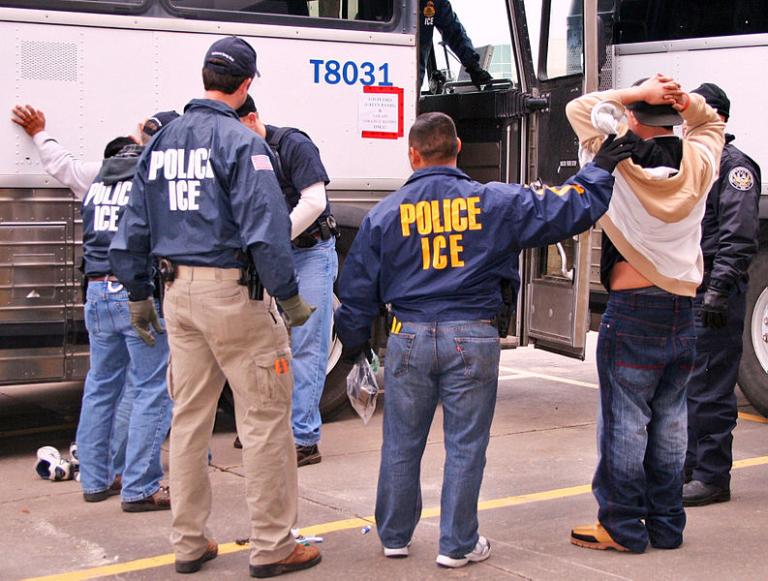
At his homily at the Pope Leo event at Rate Field in June, he said this:
Without question, countries have a duty to secure their borders, protect the public from crime and violence and enact reasonable rules for immigration. At the same time, it is wrong to scapegoat those who are here without documents, for indeed they are here due to a broken immigration system which both parties have failed to fix.
The task before us in this moment as Christians, is to call each other to live with authenticity, as authentic persons, rejecting language or activity that demonizes and degrades the dignity of others, that pretends that some persons are unworthy to be connected to us. That is foreign to our calling to be persons in the image and likeness of God.
It is also dishonest, for indeed, so many of the undocumented have for decades been connected to us. They are here not by invasion but invitation — to harvest the fruits of the earth that feed our families, to clean our tables, homes and hotel rooms, to landscape our lawns, and yes even to care for our children and elderly.
In remarks in Mexico immediately before Trump’s inauguration, he said the following:
The choice is not simply between strict enforcement and open borders, as some commentators would have us believe. Speaking this year to ambassadors accredited to the Holy See, for example, Pope Francis spoke of the need to balance migration governance with regard for human rights and dignity. “We are quick to forget that we are dealing with people with faces and names,” he said. The Holy Father has also been clear that “no one should be repatriated to a country where they could face severe human rights violations or even death.” This is not idle speculation. Millions of migrants flee their homelands for safer shores precisely because it is a life or death issue for them and their children.
I could find more examples, but please trust me that he always repeats the same three themes: first, that deporting those guilty of violent crime is acceptable but not really for any other reason; second, that we, collectively, have invited illegal immigrants into our country; and, third, that every illegal immigrant to the United States is here only because they would be persecuted or starve in their home countries.
Of course, the first theme flows from the second and third; he rejects deportation of any but violent criminals because he believes the others. But it is simply untrue that Americans fairly uniformly and with a widespread consensus believe or believed that illegal immigration is just fine. Yes, there are Americans who believe that being able to hire an illegal immigrant and pay them under the table for nannying or housecleaning or yardwork is a nice and tidy benefit and a way to get around the higher wages for Americans. There are businesses who are well aware that workers who don’t speak English but are presenting IDs with names like John Rakowski are not actually law-abiding, and are either happy to pay the low wages or feel compelled to do so in order to avoid being undercut by competitors. But this does not mean that Americans, as a people, a citizenry, have accepted this. They may feel politically powerless or resigned to the status quo because “the system” says nothing is enforceable. But the United States is not a third-world country, or indeed that sort of lower-income country, however you want to apply labels, where “working under the table” is simply a routine fact of life. Yes, it happens, but it’s rare, not normal.
And of course Cupich’s statements throughout the years that immigration is “life or death” is just as absurd, and it should be common sense. I think I’ve blogged before (and with any luck tagging this post will bring others up) that this opinion really seems to have its origin in a sheltered enough life that adapting to another country seems such a near-insurmountable challenge that anyone venturing it would surely be desperate. But it’s not, all the more so for people with the access to home countries and immigrant support communities, translation support, etc., that exists today.
But how does all of this this cause harm?
First, by making expansive demands rather than tailored proposals, he makes it less rather than more likely that he and other supporters of the cause will achieve any goals at all.
A proposal to offer protection to the longest-resident illegal immigrants might have achieved its goal, especially if those immigrants could prove some degree of integration into the community (English knowledge, at a minimum). It would position its proponents as reasonable moderates and build credibility. A demand that any deportation except for violent criminals is immoral, has no chance of being listened-to; it just sets up defiance, especially when on-the-ground there are attempts to prevent ICE enforcement actions by meeting them with violence.
And, second, the actual resources the Archdiocese is offering are not “meeting the moment” in practical ways, but indicate they are digging in and leaning hard into the Illinois approach of protecting illegal immigrants at all costs.
The relevant web page is “Immigrant Assistance Resources.”
At a time when the Trump administration is removing criminals and individuals with deportation orders (which often include sympathetic-looking parents and grandparents with old deportation orders which bureaucrats in prior administrations chose not to enforce), revoking TPS and parole, and, now, speedrunning asylum and other immigration cases, the top priority for every immigrant without a secure legal status should surely be power of attorney as well as guardianship arrangements for children, to be able to plan for a potential detention. It would also be appropriate to advise immigrants of other countries which offer opportunities; for instance, it’s apparently fairly easy for someone from a former Spanish colony (e.g., Venezuela) to immigrate to Spain, and those immigrants with some degree of education can find opportunities in Europe.
Instead, the assistance offered at the links on this page are focused on legal help (e.g., to purse a legal status, which may not be a realistic game plan, to appeal rulings, fight against deportation, etc.,) or social services (e.g., benefits available regardless of legal status or specifically targeted at those with a legal status such as refugees). Functionally, these programs all affirm the claim that “immigrants have a moral right to be here even if they don’t have a legal right.”
In fact, if I look at the PDF materials for an Archdiocese training program on immigration, it is readily apparent that they promote the view that the illegal nature of, well, illegal immigration, is unimportant.
The booklet The Reality of Immigration, after a history lesson on immigration, which has as a theme that God calls people to migrate, says,
Many argue that in past generations (which for many include our grandparents and parents) came to this country by legal means. But today’s immigration system is very different. It is fraught with problems and backlogs, and it is almost impossible for people to adequately navigate the system.
In other words, and considering the overall context of the document, because of the “problems” and “backlogs” associated with immigrating legally, it is not wrong to come illegally at all. And indeed in the closing prayer, immigrants participating in these sessions are given the following text:
Lord, at some moment you called us or allowed us to leave our land, sometimes with much pain.
What it comes down to is this: it might feel good to affirm to illegal immigrants that they have done nothing wrong and are morally in the clear to have crossed borders, worked under the table, purchased false or stolen IDs or used the ID of their citizen children, etc. But it involves telling falsehoods — the twin claims that the very lives of these migrants were endangered due to persecution or starvation, and that the American people, collectively, wished them to come. And persisting in these claims rather than providing realistic practical help in a changed environment of immigration enforcement, harms everyone.










